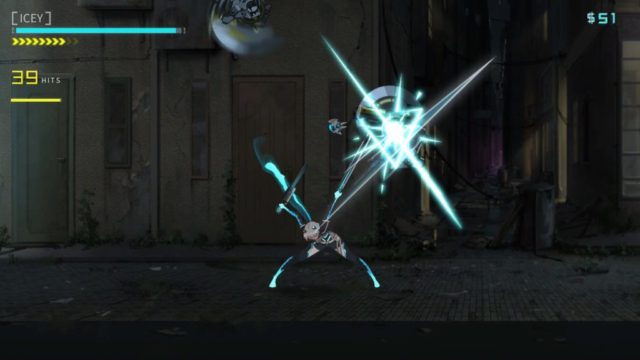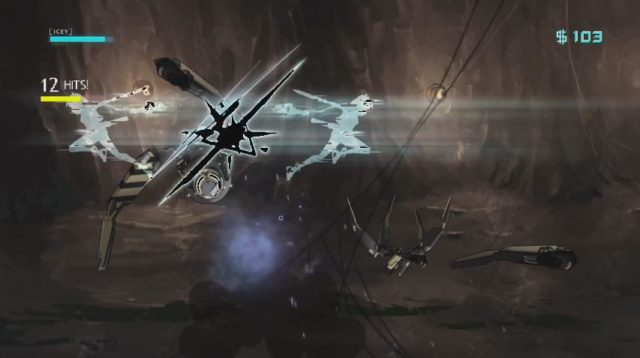Great aesthetic and music; solid combat and platforming mechanics; interesting meta storytelling and commentary.
Won't take long to see all the content; combat prone to moments of frustrating cheapness; narrator's performance could have been better.
At first glance, ICEY is a 2D action platformer in the vein of something like the Castlevania franchise, and it pulls that off relatively well. However, ICEY aims a bit higher than being just another good looking indie take on a classic gameplay formula. While the game is exactly that, it also comes with an extra dose of meta commentary.
In ICEY, you take control of the titular character, a combat android tasked with saving the world from Judas, an evil despot with an army of robots trying to destroy the world. If you stay on the rails, the story doesn’t really evolve beyond this, but ICEY isn’t a game about staying on the rails. Exploring the world and ignoring the narrator’s insistence on pressing forward reveals plenty of secrets including extra endings filled with everything from fourth-wall breaking jokes to extra lore. Apparently, Judas got his power from some sort of techno-Lovecraftian horror and there is a cult surrounding him, but while this adds some interesting color to the world, it doesn’t really add too much depth. It’s the meta commentary that is the real incentive to explore.
Throughout the game, the aforementioned narrator tells you to follow the arrows pointing you toward the next objective, but you are constantly presented with opportunities to follow other paths and ignore those suggestions. Sometimes your deviations lead to extra dialogue as the narrator expresses his frustration, sometimes you are given extra endings, and other times you even get glances at the game’s “development”, some possibly real while others are likely dramatized. These range from insightful to funny, such as a glance at early gameplay prototypes and the director’s efforts to fund the game through a promotional tie-in with a girl group. These extra scenes are almost always worth it, and it’s legitimately fun to try to find all the ways in which you can go against the narrator’s suggestions.

The game’s efforts to question players’ agency and general commentary is interesting, though it isn’t quite pulled off perfectly. The narrator’s voice work is disappointingly mediocre. The performance is far from terrible but the delivery doesn’t quite sell the level of frustration and anger the situation and dialogue suggests. Also, the general commentary falls short of some other games that have attempted the meta angle. For those looking for such an experience, your time is better served with The Stanley Parable, Spec Ops: The Line, or Nier: Automata. Then again, none of those games are on Switch, so for some gamers out there, ICEY might be the most accessible option.
While ICEY’s artistic ambitions are admirable, it’s also worth mentioning the core gameplay is really fun. Traversing the world is done through a mix of running, jumping, and dashing, and it all flows together very well. The platforming stakes are often very low with only the occasional damaging hazard in the way, but the great vertical and lateral mobility offered by the dash mechanic more than makes up for a lack of tension. Given the game’s emphasis on exploration and the many rewards and secrets hidden throughout the game, this level of mobility is greatly appreciated and really helps make the moment to moment gameplay enjoyable throughout.
The combat doesn’t fare quite as well, but it still generally delivers a solid experience with an effective yet familiar combo system based on light and strong attacks. The great jumping and dashing mechanics also help give the player great options for taking the fight to the air with plenty of options for launching and juggling most enemies. Dashing also plays a big role in dodging attacks as a well-timed dodge creates the opportunity for a special follow-up attack. One unique mechanic is the addition of finishing moves that can be activated during a generous window when enemies are low on health. Pulling off one of these finishers restores a little health and releases orbs that can also be used to charge up a special attack that hits all enemies on screen. Killing enemies rewards ICEY with money that can be spent on upgrades, ranging from health increases to new combos. The list of available moves never approaches the variety you’d find in a Bayonetta game, but there are enough options to add some solid variety while also giving some options for customization.

The combat does have its flaws. Fights generally occur in waves in restrained arenas, which means new enemies spawn in as other enemies are defeated. Unfortunately, enemies sometimes appear while in an attack animation, thus allowing them to land very cheap hits. Also, certain bosses and enemies, especially in particular combos, can very easily get ICEY caught in frustratingly long stun locks as they land a series of unavoidable blows. This particular issue is made all the more annoying by some enemies that are surprisingly hard to stagger consistently. Thankfully these problems never ruin the game, but it does create moments of frustration that could have easily been avoided with some smart re-balancing.
Fortunately, ICEY’s audio and visual presentation is more of a clear cut success. While the narrator’s performance falls a little short, the music is quite good with the overall quality of the mostly electronica soundtrack improving as the game progresses. The music often fits the visuals very well as you go from the atmospheric ruins of society to the high tech tower Judas calls home and all these worlds look great, with realistic looking backgrounds filled with lots of little details. Some areas are repeated a little too much, but they still look quite good. The character models also look fantastic with many enemies featuring some rather unique designs. ICEY herself looks especially great with very fluid animations and a very effective anime inspired design.
ICEY is a really solid action game with an appreciable effort to do something unique with its storytelling. Granted, other games have approached meta commentary before and done it better, but it doesn’t stop ICEY from being an admirable effort enhanced by enjoyable gameplay and a cool aesthetic. However, the factor that might ultimately effect some gamers’ opinions of ICEY is its length. Playing it straight through, which is admittedly how you shouldn’t play it, would likely take less than two hours. However, even by trying the narrator’s patience and exploring every nook and cranny of the world, it is easy to plow through everything in under four or five hours. Assuming that limited playtime isn’t enough to dissuade you, ICEY is a good game that balances its ambitions and its gameplay very well so it manages to stand out in an increasingly crowded eShop.
Nintendojo was provided a copy of this game for review by a third party, though that does not affect our recommendation. For every review, Nintendojo uses a standard criteria.




 ShareThis
ShareThis





